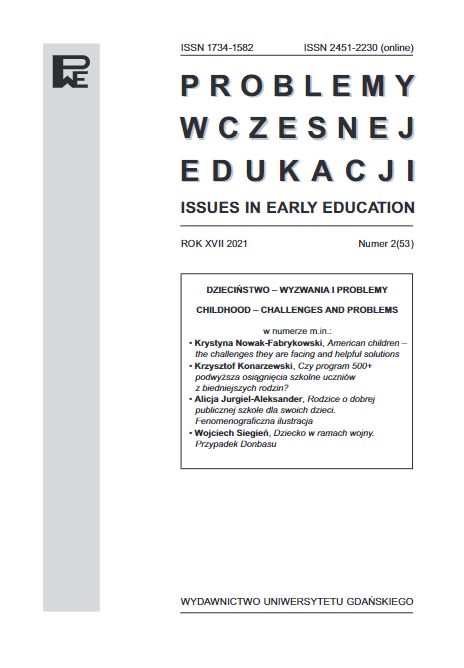Czy nuda w szkole może stanowić barierę w edukacji?
DOI:
https://doi.org/10.26881/pwe.2021.53.08Słowa kluczowe:
nuda, klasa szkolna, dzieci, nauczyciel, zagrożenia edukacyjne, komunikacja, relacje w grupie rówieśniczej, funkcjonowanie ucznia w grupieAbstrakt
Analysing the phenomenon of boredom in the context of educational barriers, I assume that the boredom is the one of the negative emotions. We experience boredom not only at school. That is why, the goal of research in pedagogy should be getting to know its specificity. Unfortunately, research work on boredom is not undertaken willingly. This has consequences: we do not know enough about the emotion of boredom and thus – we are not aware of existence of its consequences and limitations. In the article I present the results of research conducted in a group of students and teachers. The aim of the study was to understand how they see, feel and describe boredom. In the article I focus on barriers such as lack of knowledge about boredom, social learning of boredom, inhibition of conversation and communication process in the classroom, training of social isolation, feelings of fear, the threat of lower school achievements, poorer functioning and well-being of the student, equation of boredom with lack of being busy, and acceptance of boredom as a taboo.
Downloads
Bibliografia
Auerbuch G. (2011), Phenomenological investigation of occupational boredom, and the transformational impact of structured gratitude practice. Proquest, Umi Dissertation Publishing.
Becker C., Kopp S., Wachsmuth I. (2004), Stimulating the emotion dynamics of a multimodal conversation agent. W: E. André, L. Dybkjaer, W. Minke, P. Heisterkamp (eds.), Affective dialogue systems. Heilderberg, Springer.
Breidenstein G. (2007), The meaning of boredom in school lessons. Participant observation in the seventh and eight form. „Ethnography and Education”, 1(1).
Brisset D., Snow R.P. (1993), Where the Future Isn’t. „Symbolic Interaction”, 16(3).
Caldwell L.L., Darling N., Payne L.L., Dowdy B. (1999), „Why are you bored?” An examination of psychological and social control causes of boredom among adolescents. „Journal of Leisure Research”, 31(2).
Damrad Frye R., Laird J.D. (1989), The experience of boredom: the role of the self – perception of attention. „Journal of Personality and Social Psychology”, 57(2).
Daniels L.M., Stupinsky R.H., Pekrun R., Hayens T.L., Perry L.P., Newall N.E. (2009), A longitudinal analysis of achievement goals: from affective antecedents to emotional effects and achievement outcomes. „Journal of Educational Psychology”, 101(4).
Darden D., Marks A. (1999), Boredom: a socially disvalued emotion. „Sociological Spectrum”, 19(1).
Daschmann E.C., Goetz T., Stupinsky R.H. (2011), Testing the predictors of boredom at school: Development and validation of the precursors to boredom scales. „British Journal of Educational Psychology”, 81.
Estwood J D., Frishen A., Fenske M.J., Smilek D. (2007), The unengaged mind: defining boredom in terms of attention. „Perspectives of Psychological Science”, 7(5).
Farrell E. (1988), Giving voice to high school students: pressure and boredom, ya know what I’m sayin’? „American Educational Research Journal”, 25(4).
Gjesme T. (1977), General satisfaction and boredom at school as a function of the pupils’ personality characteristics. „Scandinavian Journal of Education”, 21.
Goetz T., Frenzel A.C., Hall N.C., Nett U.E., Pekrun R., Lipnievich A.A. (2018), Types of boredom: An experience sampling approach. „Motivation and Emotion Journal”, 38.
Gurycka A. (1977), Przeciw nudzie. Warszawa, Nasza Księgarnia.
Hillard V.E. (1988), Boredom and the pedagogy of responsibility. Paper presented at the Annual Meeting of the Central States Speech Association.
Klus-Stańska D., Nowicka M. (2009), Sensy i bezsensy edukacji wczesnoszkolnej. Warszawa, WSiP.
Kozielecki J. (1988), Człowiek wielowymiarowy. Warszawa, Wydawnictwo Akademickie „Żak”.
Larson R.W., Richards M.H. (1991), Boredom in the middle school years: blaming school versus blaming students. „Americam Journal of Education”, 99(4).
Marton F. (1981), Phenomenography – describing conceptions of the world around us. „Instructional Science”, 10.
Mastro D.E., Eastin M.S., Tamborini R. (2002), Internet search behaviours and mood alterations. A selective exposure approach. „Media Psychology”, 4.
Mikulas W.L., Vodanovich S. (1993), The essence of boredom. „Psychological Record”, 43(1).
Moore G.E. (1987), Down with boredom! „Vocational Education Journal”, 62(5).
Moroz J. (2013), Fenomenografia jako metoda badania treści świadomościowych. „Pedagogika Szkoły Wyższej”, 1.
Nett U., Daschmann E.C., Goetz T., Stupinsky R.H. (2016), How accurately can parents judge their children’s boredom in school? „Frontiers in Psychology”, 7.
Nett U., Goetz T., Daniels L.M. (2010), What to do when feeling bored? Students’ strategies for coping with boredom, „Learning Individual Differences”, 20.
Pekrun R., Elliot A., Maier M. (2006), Achievement goals and discrete achievement emotions: a theoretical model and prospective test. „Journal of Educational Psychology”, 98(3).
Pekrun R., Goetz T., Daniels L.M., Stupnisky R.H., Perry R.P. (2010), Boredom in achievement settings: Exploring control – value antecedents and performance outcomes of a neglected emotion. „Journal of Educational Psychology”, 102(3).
Perkins R., Hill A. (1985), Cognitive and affective aspects of boredom. „British Journal of Psychology”, 76.
Podstawa programowa. Cele kształcenia ogólnego dla klas I–III. https://podstawaprogramowa.pl/ Szkola-podstawowa-I-III, 15.06.2021.
Scerbo M., Holcomb J. (1993), Effects of signal conspicuity and time on boredom in vigilance. Paper presented at the first Mid-Atlantic Human Factors Conference, Reston.
Spacks P. (1995), Boredom: The Literary History of a State of Mind. Chicago, University of Chicago Press.
Stańczyk P. (2012), Nuda w szkole – między alienacją a emancypacją. „Teraźniejszość – Człowiek – Edukacja”, 59(3).
Strong R., Silver H., Perini M., Tuculescu G. (2003), Boredom and its opposite. „Educational Leadership”, 61(1).
Słownik języka polskiego PWN, https://sjp.pl/bariera, 2.07.2021.
Winter R. (2012), Nuda w kulturze rozrywki. Kraków, WAM.
Włodarczyk R. (2010), Strategie władzy, taktyki emancypacji. „Ukryty program” a świadomość praktyczna w edukacji nauczycieli. „Kultura i Edukacja”, 2.

 Uniwersyteckie Czasopisma Naukowe
Uniwersyteckie Czasopisma Naukowe





